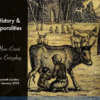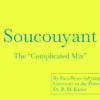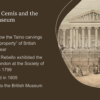Monthly Archives: February 2022

“The Perpetual Search” – Luna Njoku Dominguez
In week 3, both Dionne Brand and Saidiya Hartman attempted to define the impossible experience of attempting to trace an origin which has been displaced by the transatlantic slave trade. This map is an attempt to represent the entanglement of pasts and migrations (forced and later voluntary) which produce identities and global dynamics but which…
Read more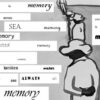
Memory, Ocean, and Trinidad and Tobago – Sabria Schouten
Inspired by the discussion of Zong! in this course and by the lecture on poetry, I chose to create a piece of found poetry connected to NourbeSe Philip’s work. The poem below is composed of words from the following quote found in Zong!, in the chapter entitled “Notanda”, where NourbeSe Philip writes: “Our entrance to…
Read more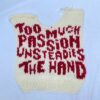
Too Much Passion Unsteadies the Hand – Loïs van Albada
Cartography has been perceived as an unbiased practice in the past, the capturing of the world as the world is. But over time it has become clear that map-making is not unbiased as the representation of some matters will always mean the erasing of others. Kei Miller’s poem The Cartographer Tries to Map a Way…
Read more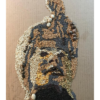
An Ethnobotanical Portrait of a Creole Woman – Luka Hattuma
This portrait of a Creole woman is made of thirteen different seeds on a side of an old cardboard box. Taking an ethnobotanical viewpoint, the aim of this portrait is to visualize the intermingled identity of Creole beingness, both on a cultural level as well as on an ecological level. Since 1492, plants, people and…
Read more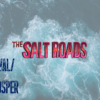
Performing a speculative geopoetics by mapping Nalo Hopkinson’s The Salt Roads – Danny Steur
To offer a cultural map of the Caribbean, the archipelago profoundly characterized by transculturality and historical, political, social and other kinds of entanglements and Creolization, I used The Salt Roads, written by Jamaican-born speculative fiction writer Nalo Hopkinson, as a point of departure to offer a rendition of the ways in which sociopolitical, cultural and…
Read more
The Haitian Revolution: A Ruttier – Mara van Herpen
The focus of my cultural map is the Haitian Revolution, which took place roughly from 1757 through to 1820. In “Hegel and Haiti”, Susan Buck-Morss makes an argument against the marginalization of the colonies in narratives about moves towards democracy and equality during the Enlightenment period (836). Never having encountered this revolution in any of…
Read more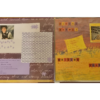
Literary Map of the Caribbean – Emily Evers
For a long time now, I have wanted to create an overview of key writers that I encounter during my studies. I will often recognize the name, but be unable to place the writer – where they are from, what their key writings are etc. The cultural map that I have created has been the…
Read more

